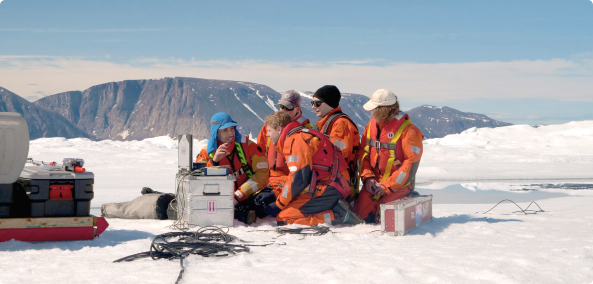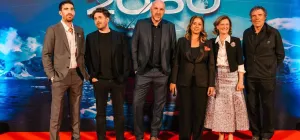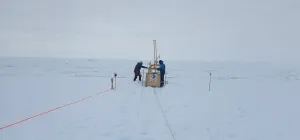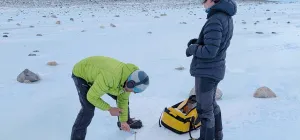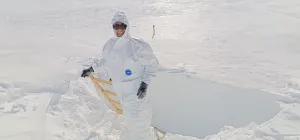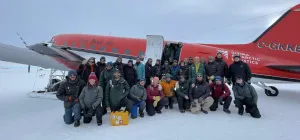2050: A film by Eric Goens and Kristof Van Den Bergh - Will the world listen before it’s too late?
Wildfires in California, floods in Spain and the Ardennes, Hurricane Hélène leaving a trail of destruction across the United States… The climate record of 2024 is devastating: the hottest year ever recorded, with 219 officially registered weather disasters and thousands of victims.
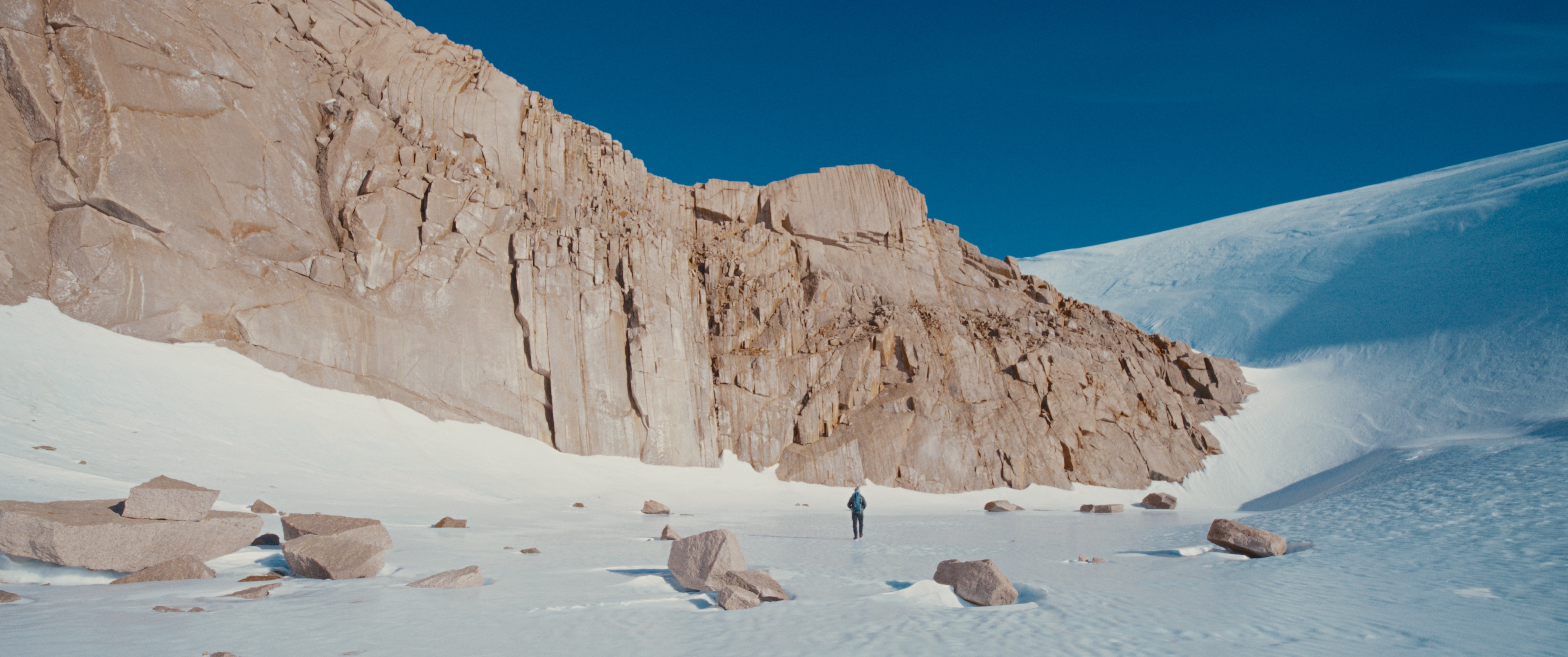
Wildfires in California, floods in Spain and the Ardennes, Hurricane Hélène leaving a trail of destruction across the United States… The climate record of 2024 is devastating: the hottest year ever recorded, with 219 officially registered weather disasters and thousands of victims.
Brussels, February 26th
Wildfires in California, floods in Spain and the Ardennes, Hurricane Hélène leaving a trail of destruction across the United States… The climate record of 2024 is devastating: the hottest year ever recorded, with 219 officially registered weather disasters and thousands of victims.
And yet, in an endless stream of fake news, most people seem to have lost track of reality. How sick – or healthy – is our climate? What is fact, and what is fiction?
In 2050, we travel to the most remote place on Earth: Antarctica. A world of ice, wind, and absolute silence. But also a world that is now crying out louder than ever. Because to truly understand the state of our planet, we must go to the place where the impact of climate change is most acute.
"The pace at which Antarctica is melting is unprecedented. Some people worry about their garage being flooded for a day. We must realize that these symptoms are not temporary but permanent. The melted ice water is moving fast, at an alarming rate." — Eric Rignot, International Glaciologist & Founder of NISAR (NASA).
With award-winning documentary filmmaker Eric Goens as our guide and legendary polar explorer Alain Hubert — founder of the International Polar Foundation (IPF) and leader of the research expeditions that take place at the Belgian Princess Elisabeth Station — as our compass, 2050 offers a raw and confronting look at the heart of scientific climate research. We follow dozens of scientists to Antarctica and join them in the search for sustainable solutions.
"We are the first generation to both understand the problem and know the solution," says Eric Goens. "It is our duty to protect this planet from even greater disasters. We owe it to all the generations that will come after us." — Eric Goens.
“Science is our compass in navigating the future of our planet. If we truly want to preserve Earth, we need to invest in polar research — especially in Antarctica, where the delicate equilibrium of our planet's climate hangs in the balance. History has shown us the power of international collaboration, from Belgium’s pioneering Antarctic expedition of Adrien de Gerlache in 1897, to the world’s first zero-emission research station, the Princess Elisabeth Antarctica. Today, as we embark on designing the next generation of zero-emission research station, the Andromeda Earth Observatory, we must embrace the knowledge science provides and take responsibility for the choices that will define our future.” — Alain Hubert, President and Founder of the International Polar Foundation.
The project is proudly supported by Syensqo, a pioneer in science and sustainability. "125 years ago, our founder Ernest Solvay backed the groundbreaking Antarctic expedition of Adrien de Gerlache. Today, we continue that same commitment," says Dr. Ilham Kadri, CEO of Syensqo.
After a warm reception at the Ostend Film Festival, where it was named one of the audience favorites, 2050 is now preparing for its official cinema release on March 5th.
But the mission goes beyond the big screen. This documentary aims for an international audience—because the future starts here. And the clock is ticking.
2050 – In Belgian cinemas from March 5th!
Watch the trailer:
IPF Press contact
Joseph Cheek (e-mail: jcheek@polarfoundation.org)
Please contact us for photos.
About the International Polar Foundation (IPF)
The IPF is a private foundation with a public service mandate, created in 2002 by Alain Hubert. Its remit is to support international polar scientific research. The IPF was also behind the creation of the Princess Elisabeth Antarctica station, which was officially opened in 2009 as the first and, to date, only zero-emission station, with a view to maintaining a Belgian presence in Antarctica and pursuing its ambition in service of citizens facing climate and environmental challenges. Every year, the Princess Elisabeth Antarctica station hosts numerous scientists of all nationalities. On the horizon is the establishment of the next generation of zero emission polar research station: The Andromeda Earth Observatory.
————————-
Nederlands
2050: Film van Eric Goens en Kristof Van Den Bergh - Zal de wereld luisteren voor het te laat is?
Brussel, 26 februari
Bosbranden in Californië, overstromingen in Spanje en de Ardennen, orkaan Hélène die een spoor van vernieling nalaat in de Verenigde Staten… De klimaatbalans van 2024 is vernietigend: het warmste jaar ooit gemeten, met 219 officieel geregistreerde weerrampen en duizenden slachtoffers.
Ondanks alles lijkt het merendeel van de mensen in de niet aflatende stroom aan fake news de draad helemaal kwijt. Hoe ziek – of gezond – is het klimaat? Wat is waar? Wat is nonsens?
In 2050 trekken we naar de meest onherbergzame plek op aarde: Antarctica. Een wereld van ijs, wind en absolute stilte. Maar ook een wereld die luider dan ooit roept. Want wie wil weten hoe het écht met onze planeet gaat, moet daar zijn waar de impact van de klimaatverandering zich het scherpst laat voelen.
"Het tempo waarmee Antarctica aan het wegsmelten is, is ongezien. Sommige mensen maken zich druk over hun garage die één dag is overstroomd. We zullen er moeten aan wennen dat dergelijke symptomen niet tijdelijk, maar definitief zijn. Het gesmolten ijswater zoekt zich een weg, tegen een razend tempo.”
— Eric Rignot - Internationaal Glacioloog & bezieler van NISAR (NASA)
Met award-winnend documentairemaker Eric Goens als gids en de legendarische poolreiziger Alain Hubert - Oprichter van de International Polar Foundation (IPF) en leider van de onderzoeksexpedities die plaatsvinden in het Belgische Princess Elisabeth Station - — als kompas, brengt 2050 een rauwe en confronterende inkijk in het kloppende hart van wetenschappelijk klimaatonderzoek. We volgen tientallen wetenschappers tot in Antarctica en zoeken mee naar een leefbare oplossing.
"We zijn de eerste generatie die én het probleem én de oplossing kent," zegt Eric Goens. “Het is onze opdracht om deze aardbol te vrijwaren van nog meer en nog grotere rampen. Dat zijn we verschuldigd aan alle generaties die na ons komen."
— Eric Goens
“Wetenschap is ons kompas om de toekomst van onze planeet veilig te stellen. Om het klimaat te redden, moet er in poolonderzoek geïnvesteerd worden, vooral op Antarctica, waar het broze evenwicht van het klimaat op onze planeet op het spel staat. De geschiedenis heeft aangetoond hoe krachtig internationale samenwerking kan zijn, van de baanbrekende Belgische Antarctische expeditie van Adrien de Gerlache in 1897 tot 's werelds eerste “zero emissions” onderzoeksstation, de Belgische Princess Elisabeth Antarctica-basis. Vandaag werken wij aan het ontwerp van een zero-emissie station van een nieuw tijdperk, het Andromeda Earth Observatory, en moeten wij allen de kennis die de wetenschap ons schenkt voluit gebruiken en verantwoordelijkheid nemen voor de keuzes die onze toekomst zullen bepalen".
— Alain Hubert, Voorzitter en Oprichter van de International Polar Foundation
Het project wordt met trots ondersteund door Syensqo, een pionier in wetenschap en duurzaamheid. "125 jaar geleden steunde onze oprichter Ernest Solvay al de baanbrekende Antarctica-expeditie van Adrien de Gerlache. Vandaag zetten wij datzelfde engagement voort," aldus Dr. Ilham Kadri, CEO van Syensqo.
Na een warm onthaal op het Filmfestival van Oostende, waar de film werd uitgeroepen tot één van de publieksfavorieten, maakt 2050 zich op voor zijn officiële bioscooprelease op 5 maart.
Maar de missie reikt verder dan het witte doek: de documentaire mikt op een internationaal publiek. Want de toekomst begint hier. En de klok tikt.
2050 – Vanaf 5 maart in België de bioscoop!
Bekijk de filmtrailer:
IPF perscontact
Joseph Cheek (e-mail: jcheek@polarfoundation.org)
Voor foto's kunt u contact met ons opnemen.
Over de International Polar Foundation (IPF)
IPF is een private stichting van openbaar nut, opgericht in 2002 door Alain Hubert met wetenschappelijke persoonlijkheden uit de academische wereld. Haar missie is het ondersteunen van internationaal poolwetenschappelijk onderzoek. IPF heeft het Princess Elisabeth station op Antarctica ontwikkeld en gebouwd. Dit station is het enigste «zero emission» station ter wereld en garandeert een Belgische aanwezigheid in Antarctica om er wetenschappelijk onderzoek te kunnen verrichten en klimaat- en milieu-uitdagingen aan te gaan. Elk jaar ontvangt het Princess Elisabeth Antarctica-station tal van internationale wetenschappers. De IPF werkt nu aan de oprichting van de volgende generatie van zero emissie poolonderzoeksstations: Het Andromeda Earth Observatory.
————————-
Français
2050: Un film de Eric Goens et Kristof Van Den Bergh - Le monde écoutera-t-il avant qu’il ne soit trop tard ?
Bruxelles, le 26 février
Incendies en Californie, inondations en Espagne et dans les Ardennes, l’ouragan Hélène laissant une traînée de destruction aux États-Unis… Le bilan climatique de 2024 est accablant : l’année la plus chaude jamais enregistrée, avec 219 catastrophes météorologiques officiellement répertoriées et des milliers de victimes.
Et pourtant, dans un flot incessant de fausses informations, la plupart des gens semblent avoir perdu leurs repères. Dans quel état se trouve réellement notre climat ? Que faut-il croire ? Que faut-il rejeter ?
Dans 2050, nous nous rendons dans l’endroit le plus reculé de la planète : l’Antarctique. Un monde de glace, de vent et de silence absolu. Mais aussi un monde qui crie désormais plus fort que jamais. Car pour comprendre réellement l’état de notre planète, il faut aller là où les effets du changement climatique se font sentir avec le plus d’intensité.
"La vitesse à laquelle l’Antarctique fond est sans précédent. Certaines personnes s’inquiètent parce que leur garage est inondé pendant une journée. Nous devons comprendre que ces symptômes ne sont pas temporaires, mais définitifs. L’eau issue de la fonte des glaces avance à un rythme alarmant.”
— Eric Rignot, glaciologue international & fondateur du programme NISAR (NASA)
Avec Eric Goens, documentariste primé, comme guide, et Alain Hubert, légendaire explorateur polaire, fondateur de la Fondation Polaire Internationale (IPF) et chef des expéditions scientifiques qui se déroulent à la station belge Princess Elisabeth Antarctica,— comme boussole, 2050 propose une plongée brute et saisissante au cœur de la recherche scientifique sur le climat. Nous suivons des dizaines de scientifiques en Antarctique et explorons avec eux les solutions possibles pour un avenir durable.
"Nous sommes la première génération à la fois consciente du problème et capable d’y apporter une solution", déclare Eric Goens. "Nous avons la responsabilité de préserver cette planète et d’éviter des catastrophes encore plus graves. Nous le devons aux générations futures."
— Eric Goens
"La science est notre boussole pour garantir l’avenir de notre planète. Si nous voulons vraiment préserver la Terre, nous devons investir dans la recherche polaire, en particulier dans l'Antarctique, où l'équilibre délicat du climat de notre planète est en jeu. L'histoire nous a montré la puissance de la collaboration internationale, depuis l'expédition antarctique belge pionnière d'Adrien de Gerlache en 1897, jusqu'à la première station de recherche zéro émission au monde, la base belge Princess Elisabeth Antarctica. Aujourd'hui, alors que nous travaillons au développement d’une station zéro émission d’une nouvelle ère, la « Andromeda Earth Observatory », nous devons utiliser au mieux toutes les connaissances que la science nous apporte et assumer la responsabilité des choix qui définiront notre avenir".
— Alain Hubert, Président et Fondateur de la Fondation Polaire Internationale (IPF)
Ce projet est soutenu avec fierté par Syensqo, un pionnier de la science et du développement durable. "Il y a 125 ans, notre fondateur Ernest Solvay soutenait déjà l’expédition antarctique révolutionnaire d’Adrien de Gerlache. Aujourd’hui, nous poursuivons cet engagement avec la même détermination," déclare Dr. Ilham Kadri, CEO de Syensqo.
Après un accueil chaleureux au Festival du Film d’Ostende, où il a été désigné comme l’un des coups de cœur du public, 2050 se prépare désormais pour sa sortie officielle en salle le 5 mars.
Mais la mission ne s’arrête pas au grand écran. Ce documentaire vise un public international – car l’avenir commence ici. Et le compte à rebours est lancé.
2050 – Dès le 5 mars dans les cinémas belges!
Regardez la bande annonce :
Contact presse IPF
Joseph Cheek (e-mail : jcheek@polarfoundation.org)
N'hésitez pas à nous contacter pour des photos.
À propos de l’International Polar Foundation (IPF)
L'IPF est une fondation d’utilité publique créée en 2002 par Alain Hubert avec des personnalités scientifiques du monde académique. Sa mission est de soutenir la recherche scientifique polaire internationale. L'IPF est également à l’initiative de la station Princesse Elisabeth Antarctica, première station « zéro émission », en vue de préserver la présence antarctique belge et d’en poursuivre l’ambition au service des citoyens confrontés aux défis climatiques et environnementaux. Chaque année, la station accueille de nombreux scientifiques internationaux. L'IPF travaille actuellement à la mise en place de la prochaine génération de stations de recherche polaire à zéro émission : la station Andromeda Earth Observatory.
————————-
Deutsch
2050: Ein Film von Eric Goens und Kristof Van Den Bergh - Wird die Welt zuhören, bevor es zu spät ist?
Brüssel, 26. Februar
Waldbrände in Kalifornien, Überschwemmungen in Spanien und den Ardennen, Hurrikan Hélène hinterlässt eine Spur der Verwüstung in den Vereinigten Staaten …
Der Klimarekord von 2024 ist verheerend: das heißeste Jahr aller Zeiten, mit 219 offiziell registrierten Wetterkatastrophen und Tausenden von Opfern. Und doch scheinen die meisten Menschen in einem endlosen Strom von Falschmeldungen den Bezug zur Realität verloren zu haben. Wie krank – oder gesund – ist unser Klima? Was ist Fakt und was ist Fiktion?
Im Jahr 2050 reisen wir an den entlegensten Ort der Erde: die Antarktis. Eine Welt aus Eis, Wind und absoluter Stille. Aber auch eine Welt, die jetzt lauter schreit als je zuvor. Denn um den Zustand unseres Planeten wirklich zu verstehen, müssen wir dorthin gehen, wo die Auswirkungen des Klimawandels am stärksten zu spüren sind. „Das Tempo, mit dem die Antarktis schmilzt, ist beispiellos. Manche Leute haben Angst, dass ihre Garage einen Tag lang überflutet wird. Wir müssen erkennen, dass diese Symptome nicht vorübergehend, sondern dauerhaft sind. Das geschmolzene Eiswasser bewegt sich schnell, mit einer alarmierenden Geschwindigkeit.“ – Eric Rignot, internationaler Glaziologe und Gründer von NISAR (NASA).
Mit dem preisgekrönten Dokumentarfilmer Eric Goens als unserem Führer und dem legendären Polarforscher Alain Hubert – Gründer der International Polar Foundation (IPF) und Leiter der Forschungsexpeditionen, die an der belgischen Princess Elisabeth Station stattfinden – als unserem Kompass bietet 2050 einen unverfälschten und konfrontierenden Blick auf das Herz der wissenschaftlichen Klimaforschung. Wir folgen Dutzenden von Wissenschaftlern in die Antarktis und suchen gemeinsam mit ihnen nach nachhaltigen Lösungen.
„Wir sind die erste Generation, die sowohl das Problem versteht als auch die Lösung kennt“, sagt Eric Goens. „Es ist unsere Pflicht, diesen Planeten vor noch größeren Katastrophen zu schützen. Das Schulden wir alle Generationen das nach uns kommen werden.“ — Eric Goens.
„Die Wissenschaft ist unser Kompass bei der Navigation durch die Zukunft unseres Planeten. Wenn wir die Erde wirklich bewahren wollen, müssen wir in Polarforschung investieren – insbesondere in der Antarktis, wo das empfindliche Gleichgewicht des Klimas unseres Planeten auf dem Spiel steht. Die Geschichte hat uns die Macht internationaler Zusammenarbeit gezeigt, von der bahnbrechenden belgischen Antarktisexpedition von Adrien de Gerlache im Jahr 1897 bis zur ersten emissionsfreien Forschungsstation der Welt, der Princess Elisabeth Antarctica. Wenn wir heute mit der Planung der nächsten Generation emissionsfreier Forschungsstationen, dem Andromeda Earth Observatory, beginnen, müssen wir das Wissen der Wissenschaft annehmen und Verantwortung für die Entscheidungen übernehmen, die unsere Zukunft bestimmen werden.“ — Alain Hubert, Präsident und Gründer der International Polar Foundation.
Das Projekt wird unterstützt von Syensqo, einem Pionier in Wissenschaft und Nachhaltigkeit. „Vor 125 Jahren unterstützte unser Gründer Ernest Solvay die bahnbrechende Antarktisexpedition von Adrien de Gerlache. Heute setzen wir dieses Engagement fort“, sagt Dr. Ilham Kadri, CEO von Syensqo.
Nach einem herzlichen Empfang beim Ostende Film Festival, wo er zu einem der Publikumslieblinge gekürt wurde, bereitet sich 2050 nun auf seinen offiziellen Kinostart am 5. März vor.
Aber die Mission geht über die große Leinwand hinaus. Dieser Dokumentarfilm zielt auf ein internationales Publikum ab – denn die Zukunft beginnt hier. Und die Uhr tickt.
2050 – Ab 5. März in den belgischen Kinos!
Sehen Sie sich den Filmtrailer an:
IPF Pressekontakt
Joseph Cheek (e-mail: jcheek@polarfoundation.org)
Für Fotos kontaktieren Sie uns bitte.
Über die International Polar Foundation (IPF)
Die IPF ist eine private Stiftung mit öffentlichem Auftrag, die 2002 von Alain Hubert gegründet wurde. Ihr Auftrag besteht darin, die internationale Polarforschung zu unterstützen. Das IPF stand auch hinter der Gründung der Antarktisstation Princess Elisabeth, die 2009 als erste und bislang einzige emissionsfreie Station offiziell eröffnet wurde, um die belgische Präsenz in der Antarktis aufrechtzuerhalten und ihre Ambitionen im Dienste der Bürger zu verfolgen, die mit Klima- und Umweltproblemen konfrontiert sind. Jedes Jahr unterstüzt die Antarktisstation Princess Elisabeth zahlreiche Wissenschaftler aller Nationalitäten. In Sicht ist die Gründung der nächsten Generation emissionsfreier Polarforschungsstationen: Das Andromeda Earth Observatory.
Download